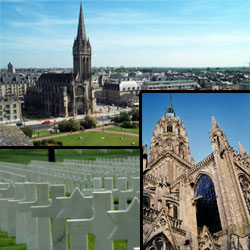
I ended my first evening in Caen by going into the small bar du faculté and ordering a sweet Spanish beer that had the same name as my college (Fisher beer, St. John Fisher College.) About two minutes after my arrival, a man my own age came up to me. He smiled, sat next to me, ordered a beer, looked at me out of the corner of his eye, turned, and said in flawless English, “Are you an American?”
“Oui,” I responded, eager to talk to someone in French.
“Good,” he continued in English. “I hate Americans.” With this, he left.
I was stunned. Why had he bothered to tell me this? What was wrong with Americans? What was wrong with me? What had I ever done to him? Ashamed, I downed my beer and quickly left the bar.
I puzzled over the young man’s statement all the way home. Did all French people hate Americans? Will everyone react to me the same way? Did I make a big mistake coming here?
I had, however, precious little time to think about it. The next day classes started, and I immediately found myself in trouble. The guttural Norman accent, so different from the mellifluous French I was used to, made comprehension a nightmare. The teaching style was vastly different as well: no one dared to interrupt the professor; no one asked questions; no one even left to go to the bathroom. My classroom was on the seventh floor of a building, but only faculty were allowed to use the elevator. And everything seemed to move so fast; for the first time in my life, I felt academically impotent, not that I couldn’t do it but that I didn’t even now how to begin.
Still, I was determined to learn and enjoy my time in France to the utmost. I studied like I had never studied before (thankfully, in one of my classes there was a native-English speaker who was a big help; my independent study professor proved very patient with me, and my third class, the history of the D-Day invasion, was taught by a British colonel who had been there; since he spoke no French, and I was the only native-English speaker in the class, I was his prize pupil.) It is customary in France for students to go out every night, to drink and relax, but, despite my homework having been completed before I went out, I still came home every night at 10 for extra study time (well, almost every night). Still, I managed to meet lots of people and became quite popular with the natives. Everyone was fascinated with, or at least highly amused by, the American from New York. I would talk for hours about my life in the United States, and every night a different audience would sit, enraptured. I had never felt damn special before, but sitting on a tall, rickety bar stool, with four or five different people listening to my yarns and tales of New York life (most of them true), I felt like the only American left in the world, and to be honest, it felt good.
I also took time out to explore the Northern coastal regions of France. I saw the famous Bayeux tapestry and snuck into the eerie crypts of the Bayeux cathedral. I saw famous monuments to Joan of Arc and Charles de Gaulle, saw the infamous battlefields of Agincourt and St. Mere Eglise, the pirate city of St. Malo, and walked the beaches of Normandy where the six armies of D-Day landed. Every turn was a history lesson, every house or inn had a tale to tell.
In New York State, we have battlefields. They date from the Revolution or from the French and Indian War. Seeing them always reminded me of schoolchildren, of patriotism, or of those silly red uniforms, hot and uncomfortable, that the British used to wear. French battlefields always reeked of blood. World War II. World War I. The Hundred Years War. The Revolution. The invasions of William and Henry V. The revered Charles Martel, Charlemagne, Joan of Arc and Napoleon, the hated British sovereigns and German fuhrers. It slowly dawned on me that this country had been shaped by blood and violence, conquest and defeat, that France’s boundaries had been drawn in bold crimson.
It made me sad to realize this. America teems with hope and friendliness, a general equanimity that goes hand in hand with the cynicism. In America, we always know that things are going to be all right — not great but all right. France was grim, tinged with loss, every monument and building named for some dead hero or heroine.
The World War II cemeteries are the most indescribable sights in all of France. At St. Laurent, ten thousand crosses spread in every direction, dotted with busy tourists and Stars of David. “Silence and Respect” say the signs at the gate, and “Watch for Pickpockets.” And underneath those signs are ten thousand rotting corpses, all men, all American, less than half of the men who died on Omaha Beach, soldiers fighting for now seemingly archaic ideals, for hopes lost, for dreams devoured, all of it incomprehensible to modern people. Even the German cemetery, the enemy, with its Panzer-like crosses, moved me.

